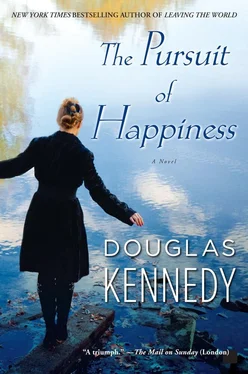'Okay - but you should also think about switching to filtered cigarettes. They're much kinder to your throat'.
'Oh God! Listen to the Bryn Mawr ascetic! Ginger ale, filtered cigarettes. Next thing you'll tell me is that, if he gets the nomination, you're going to vote for Dewey against Roosevelt in the next election'.
'You know I would never do that'.
'I think I was making a joke, S. Though I must say Daddy would be boggled beyond belief were you to vote Republican'.
'He'd still insist that I return to Hartford like a good little girl'.
'You won't be returning to Hartford after graduation'.
'He's given me a pretty stark choice, Eric'
'No - what he's doing is playing the oldest poker ruse in the world. Putting all his chips into the pot, pretending that he holds a straight flush, and daring you to see his bet. So you're going to call his bluff by taking the job at Life. And though he will grump and groan about it - and probably do a little of his Teddy Roosevelt sabre-rattling - in the end he's going to accept your decision. Because he has to. Anyway, he knows that I'll look after you in the big bad city'.
'That's what's scaring him', I said, and immediately regretted that comment.
'Why?'
'Oh, you know...'
'No', Eric said, sounding unamused. 'I don't know'.
'He probably thinks you'll turn me into a raging Marxist'.
Eric lit up another cigarette. His eyes were sharply focused, and he looked at me warily. I could tell that he was suddenly sober again.
'That's not what he said, S'.
'Yes it was', I said, sounding unconvincing.
'Please tell me the truth'.
'I told you -'
'- that he didn't like the idea of me looking after you in New York. But surely he explained why he thought I might be a bad influence'.
'I really don't remember'.
'Now you're lying to me. And we don't lie to each other, S'.
My brother took my hand, and quietly said, 'You have to tell me'.
I looked up and met his stare. 'He said he didn't think you were the most moral of men'.
Eric said nothing. He just took a long, deep drag on his cigarette, coughing slightly as he inhaled.
'Of course, I don't think that', I said.
'Don't you?'
'You know I don't'.
He stabbed the cigarette into the ashtray, and threw back the remainder of his drink.
'But if it was true... if I wasn't "the most moral of men"... would that bother you?'
Now it was his turn to meet my gaze. I knew what we were both thinking: this was an issue that we've always dodged... even though it has always been lurking in the background. Like my parents, I too had had my suspicions about my brother's sexuality (especially since there had never been a girlfriend in his life). But, back then, such suspicions were never discussed. Everything was closeted. Literally. And figuratively. To openly admit your homosexuality in forties America would have been an act of suicide. Even to the kid sister who adored you. So we spoke in code.
'I think you're about the most moral person I know', I said.
'But Father is using the word "moral" in a different way. Do you understand that, S?'
I covered his hand with mine.
'Yes. I do'.
'And does that trouble you?'
'You're my brother. That's all that matters'.
'Are you sure?'
My hand squeezed his.
'I'm sure'.
'Thanks'.
'Shut up', I said with a smile.
He squeezed my hand back.
'I'll always be in your corner, S. Know that. And don't worry about Father. He won't win this one'.
A week later, a letter arrived for me at Bryn Mawr.
Dear S,
After seeing you last Sunday, I decided that a fast day trip to Hartford was long overdue. So I jumped the train the next morning. Needless to say, Mother and Father were just a tad surprised to see me on their doorstep. Though he refused to listen at first, eventually Father had no choice but to hear me out on your behalf. For the first hour of our 'negotiations' (the only word for it), he stuck to his 'She's coming back to Hartford, and that's the end of it' line. So I started playing the 'It would be a pity if you lost both your children' card with great finesse - making it less of a threat, more of a tragic potentiality. When he dug in his heels and said that his mind was made up, I said, 'Then you're going to end up a lonely old man'. With that, I left, and took the next train back to New York.
The next morning the phone rang at the ungodly hour of eight a.m. It was Father Dearest. His tone was still gruff and inflexible, but his tune had definitely changed.
'Here's what I will accept. Sara can take the job at Life, but only if she agrees to reside at the Barbizon Hotel for Women on East 63rd Street. It comes highly recommended by one of my associates at Standard Life, and operates according to strict rules, with nightly curfews and no visitors after dark. As Mother and I will know she is being carefully looked after at the Barbizon, we will therefore accede to her demands about living in Manhattan. As you seem to have cast yourself in the role of go-between, I will leave it to you to put this proposition to Sara. Please inform her that, though she has our love and support, we will not negotiate on this issue'.
Naturally I said nothing - except that I would pass on his offer to you. But, as far as I'm concerned, this is a near-capitulation on his part. So drink five Manhattans in celebration and kiss Pennsylvania goodbye. You're going to New York... with parental blessing to boot. And don't worry about the Barbizon. We'll check you in there for the first month or two, then quietly transfer you to your own apartment. And then we'll figure out a way of breaking the news to Father and Mother without reactivating hostilities.
Peace in our time.
Your 'moral' brother,
Eric
I nearly screamed with delight when I finished reading this letter. Racing back to my dorm room, I grabbed a piece of stationery and a pen, and wrote:
Dear E,
I'm writing FDR tonight and nominating you to run the League of Nations (if it's reconstituted after the war). You're a diplomatic genius! And the best brother imaginable. Tell all the gang on 42nd Street that I will soon be there...
Love, S
I also scribbled a fast note to Father, informing him that I accepted his terms, and assuring him that I would do the family proud in New York (a coded way of letting him know I would remain 'a nice girl', even though I was living in that Sodom and Gomorrah called Manhattan).
I never received a reply from Father to my letter. Nor did I expect to. It simply wasn't his way. But he did attend my graduation with Mother. Eric took the train down for the day. After the ceremony, we all went out for lunch at a local hotel. It was an awkward meal. I could see Father glancing between the two of us, and pursing his lips. Though Eric had put on a tie and jacket for the occasion, it was the only jacket he owned (a battered Harris tweed he'd found in a thrift shop). His shirt was Army-surplus khaki. He looked like a union organizer - and chain-smoked throughout the lunch (at least he kept his liquor intake down to two Manhattans). I was dressed in a sensible suit, but Father still regarded me with unease. Having dared to stand up to him, I was no longer his little girl. And I could tell that he was finding it difficult to be relaxed around me (though, if truth be told, my father was never relaxed in the company of his children). Mother, meanwhile, did what Mother always did: she smiled nervously, and followed my father's lead on anything he said.
Eventually - after much strained talk about the prettiness of the Bryn Mawr campus, and the bad standard of service on the train from Hartford, and which neighbor's boy was serving in which corner of Europe or the Pacific - Father suddenly said, 'I just want you to know, Sara, that Mother and I are most pleased with your cum laude degree. It is quite an achievement'.
Читать дальше












